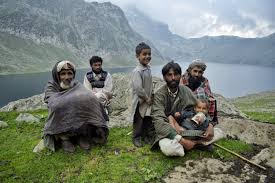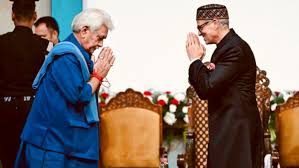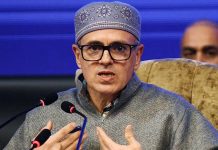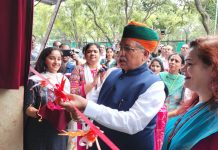Discontent among the open-category youth has been brewing since Parliamant passed the bill to raise the reservation for Paharis by 10 pc and of the other tribes and the OBCs by 8 pc in February this year, further limiting their access to employment opportunities. A report by Riyaz Wani

One of the major issues threatening to create a divergence between the newly elected Jammu and Kashmir government and Lieutenant Governor Manoj Sinha is job reservations. On November 22, Chief Minister Omar Abdullah announced a review of the region’s reservation policy, calling it a key issue of concern for the people. The policy has often been criticized for disadvantaging the majority ethnic groups—Kashmiris, who are predominantly Muslim, and Dogras, who are largely Hindu.

Omar highlighted the discontent among youth from the open category who feel they are being overlooked, while those with reservations fear losing their share.
“A lot of things are said about reservation. People are complaining and expressing their distress. Our youths from the open category think they are not getting their due. Those who have reservations don’t want their share diluted,” Omar told reporters after a cabinet meeting on November 22.
The cabinet has decided to form a sub-committee with three ministers to examine the reservation policy in detail. “A cabinet sub-committee comprising three ministers will take a holistic view of reservation and see if the Supreme Court directions are violated or not. Nobody’s right will be snatched but there will be justice for all,” he added.
J&K has now just 30 percent reservation quota for the open merit category. The reduction followed the government’s decision to raise reservation for Paharis by 10 percent and that of the other tribes and the Other Backward Classes by 8 percent.
The consequent disproportion has generated deep unease among open category candidates which form a majority as anywhere else in the country. More so, in Kashmir Valley. The 2011 census data shows that 69 percent of the Valley’s population falls under the general category, which includes those not classified under Scheduled Castes, Scheduled Tribes, and Other Backward Classes. But while reservations in the rest of the country have been capped at 50 percent, in J&K, they have been fixed at 70 percent.
Now, the demand of the unemployed youth in the general category – both in the Valley and Jammu – is that the reservation quotas be made at par with the other states and regions. There is a feeling that the doors to already fewer government jobs have been more or less shut on them. And in the absence of a viable private sector in the UT, lakhs of educated unemployed have been left to fend for themselves. Their ranks are only growing with each passing month: In the first quarter of 2024 alone, 3.52 lakh youth registered with the J&K Directorate of Employment, with 1.09 lakh of them graduates and post-graduates. They don’t have many options.
“In the absence of a government job, the educated youth either remain unemployed, engage in disguised employment, move outside the Valley, or go abroad. These are tough choices. The challenge needs to be urgently addressed, and should be the first order of business for the new elected government,” read an editorial in a local daily. “While acknowledging the need for reservations for the backward castes and communities, the quotas need to be made proportionate to the share of the different communities in the overall population. Leaving the issue unaddressed for long will certainly be a recipe for more social discontent.”
It was in February this year that the parliament passed a bill to include the Pahari community in the Union Territory’s Scheduled Tribe list. The Constitution (Jammu and Kashmir) Scheduled Tribes Order Amendment Bill, 2023, was passed through a voice vote, reflecting bipartisan support.
The bill not only includes the Pahari ethnic group but also extends the Scheduled Tribe status to the Gadda Brahman, Paddari Tribe, and Koli communities in Jammu and Kashmir. The move’s purported aim was to address historical disparities and provide equitable opportunities to these communities. Simultaneously, the Lok Sabha incorporated the Valmiki community into the Scheduled Castes list of the Union Territory, along with its synonyms.
While this change was seen by some as a step towards social justice, it drew opposition from the Gujjar community, who feared adverse consequences. At the time of the passing of the bill, the Gujjar-Bakerwal community in Jammu was protesting against it. The Gujjar-Bakerwal community asserts that Paharis, being considered a forward caste community, would potentially displace Gujjar-Bakarwal and other marginalized ST communities from the benefits designated for tribes people if included in the ST list.
Politics was a big factor in the BJP’s decision. The saffron party was believed to have calculated that granting Scheduled Tribe (ST) status to the Pahari community would lead to their alignment with the BJP’s established voter support, thereby contributing to the party’s success throughout the Rajouri-Poonch region. This is because unlike the Pahari community, the Gujjar-Bakerwal community consists entirely of Muslims. The decision to give reservations to the communities was seen as a clever pre-poll gambit by the BJP. Gujjars, Bakerwals, and Paharis comprise 40 percent of the population in border districts. And the calculation did pay off for the party: it secured 29 of the 43 seats in the recent Assembly polls in Jammu region.
Contentious issue
The reservation issue has become a politically contentious issue between the BJP on one side and the ruling NC and the remaining opposition parties on the other hand. Within the NC itself, the issue is creating some rift between the leaders who want an early action and those who want to adopt a more cautious approach in view of the BJP’s opposition.
NC MP Aga Syed Ruhullah has warned of a protest if the policy is not reviewed by December 22. “If a decision isn’t made by December 22, I will sit on a dharna outside the Chief Minister’s residence,” he recently declared. PDP MLA Waheed ur Rehman Para echoed the concerns, saying, “Opportunities for general category people are shrinking. Reservation should be based on population ratio.”
The controversy intensified over the allocation of 575 lecturer posts in the education department, with only 238 seats allotted to the general category. The remaining positions are distributed across reserved categories, including SC, ST-1, ST-2, OBC, and others.
The policy has particularly affected the Gujjar-Bakarwal community, now categorized as ST-1, while hill tribes are classified as ST-2. This division seeks to protect the existing quotas of the Gujjar-Bakarwal group. However, with 69% of the region’s population belonging to the general category, critics argue that their opportunities are disproportionately shrinking.
The districts of Poonch and Rajouri, where reserved communities are concentrated, have seen almost total reservation, further adding to the discontent. The government has called for patience, assuring that steps are being taken to address the issue. Opposition parties led by the PDP, however, remain firm, seeking an equitable solution, warning of risks to equality and social harmony if the policy is not reconsidered.
But few expect the issue to be resolved unless J&K gets its statehood back. This will enable the elected government to review the current reservation quota and make changes. With the BJP still effectively in charge through the Lieutenant Governor, who wields most of the power, the elected government is unlikely to be allowed to have its way on the issue.












